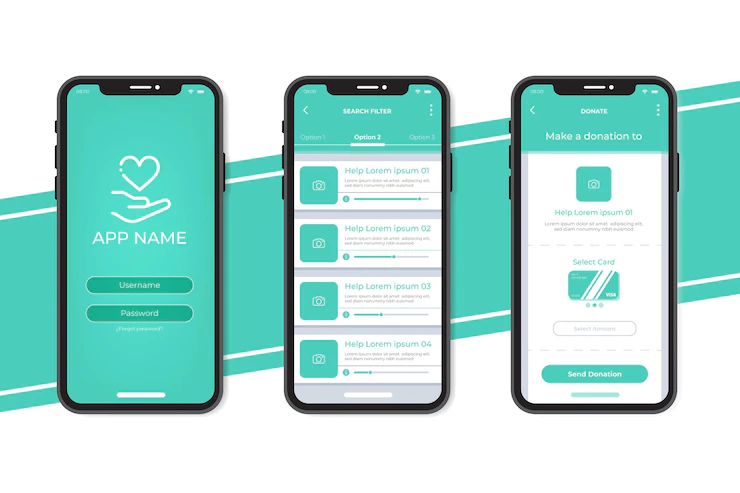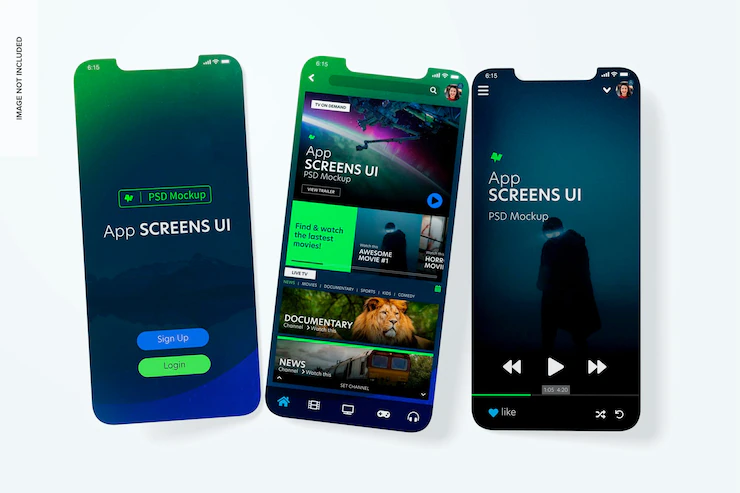Cross-Platform App Development
In the modern world, having a presence on several platforms gives companies leverage over competitors and enables them to expand their business reach. At the core of the digital revolution are billions of mobile devices that run on different operating systems. It makes sense for companies to develop mobile applications compatible with existing operating systems. There is a recent shift to web-based applications. It simplifies business operations, improves and synchronizes data management across platforms and enhances productivity.
Cross-platform app development agencies specialize in the life-cycle management of mobile applications that run on multiple OS platforms. Stoke Ventures, an experienced enterprise software development company, specializes in designing, deploying and maintaining various cross-platform applications. How do we manage the development process? What frameworks do our technical teams use to develop these applications?
Cross-platform apps are designed to work on different operating systems
Here is a simple guide to cross-platform app development. We handle the difficult tasks and ensure your app meets the minimum requirements to run on iOS, Android, Windows, and any other devices or firmware used by the company’s customers or potential clients.
What is Cross-Platform App Development?
Before we proceed, we must understand what cross-platform app development is. It may sound like an out-of-this-world concept – or at least sounded impossible during the early age of smartphones. How can developers use the same set of codes to create an application working on android, iOS, Windows and Blackberry platforms? Hard, isn’t it?
Cross-platform app development is a strategic approach for building robust mobile solutions compatible with various mobile operating systems (or platforms). It is a shift from the native app development, where apps are built for specific platforms. For instance, native development of iOS apps means the final software product works on Apple devices only. However, with cross-platform app development, companies can create the same product with slight information architecture tweaks to ensure they operate efficiently on Android, iOS, Windows and any other available operating system. All the developer requires is a code written once, using specific programming languages for use in subsequent app development processes to facilitate quick product releases.
Developers use several programming languages to create the codebase. These languages are not native to particular operating systems. Once the code is written, the developers package it into platform-specific containers. This process facilitates app integration into various platforms.
Cross-platform app development is a popular approach among enterprise app development companies. The ability of an app to operate on different devices and platforms implies that agencies can work with a small team of developers to solve complex software development issues.
Cross-platform apps must work efficiently across devices
The flexibility of this software development strategy has led to the growth of cross-platform mobile game development companies targeting wider customer markets to optimize reach and revenues. What are the benefits and challenges associated with multi-platform development?
Benefits of Cross-platform app development
Reach a Large Audience
Cross-platform app development is a great way for companies, influencers, social media marketers and businesses to reach large audiences. The cross-platform app dev teams focus on creating software that is usable on multiple platforms. Think of a marketing agency aiming to improve its brand awareness. Assuming they specialize in the development of iOS apps, then their target audience is limited to owners of Apple devices. In return, their marketing campaigns reach a sizable group of people. Now, consider the same company but with an application compatible with iOS, Windows and Android devices. The number of phone users who are likely to interact with the app increases exponentially. By developing cross-platform apps, companies can easily reach a wide audience. Leveraging cross-platform app development is a viable solution for business owners intending to scale up their operations and maintain a market presence and dominance over competitors.
Increased Revenue
Monetizing mobile apps is a superb way for small companies to diversify revenue streams and increase business profitability. Monetary compensations provided by different platforms vary. When your app is available for download on several app stores, the company receives better financial returns. The company can generate more revenue using the in-app purchase schemes and monetization mechanisms developed by specific app stores and platforms. Availing the same mobile application on multiple platforms means more people have access to the application. The more people download and use these apps, the more revenue the company earns. This will not be the case should the company limit the usability of its app to a specific platform or firmware version. The company must keep an eye on the prevailing market trends in cross-platform app development to ensure their products are attractive to wide target audiences to increase their revenue bases.
Reduced Development Costs
App development is a demanding process that requires a specific budget and the collaboration of experienced software developers. The process takes time to complete owing to its iterative nature. Companies can reduce costs associated with mobile app development by leveraging cross-platform app development best practices. The company does not have to hire multiple teams to work on similar products targeting multiple platforms. Instead, the company uses the same team to design the mobile app. The team uses the same lines of codes and optimizes them for use on different platforms. It not only reduces app development costs; it also reduces the time required to develop and deploy software products. It is advantageous since companies can utilize these applications to create brand awareness and retain customers amid stiff global competition. The availability of the apps on different app stores means companies can reach wide audiences at relatively lower costs. The cross-platform app development company designs the app once and uses it on any platform their customers are comfortable with.
Better customer engagement
Modern businesses are data-driven and companies prioritize user-centric designs and engagements. Businesses can grow their market segments by ensuring consumer-friendly engagements and the resolution of predominant challenges. By using cross-platform app development initiatives, companies avail software products to more customers on different app stores. It enables customers to access company services and software in any location. The increased customer engagement translates to better leads and conversion rates, enabling companies to make more sales.
Challenges associated with cross-platform app development
Cross-platform app development has several benefits. As a one-fit-all solution, companies can overcome multiple software development challenges. However, the strategy is not all glamorous. There are challenges associated with cross-platform app development processes an ordinary app user may notice while using a product or service. Some of these challenges include:
Usability issues
UX/UI designs affect the usability of different mobile apps. When working on native applications, app developers focus on user interfaces (UI) and user experiences (UX) to suit particular platforms and firmware. That way, the app development team optimizes every feature with specific mobile devices in mind.
However, when dealing with cross-platform app development, developers are interested in diversifying base codes to meet the minimum requirements for use on different mobile platforms. There is little focus on UX/UI designs. The team ends up developing products with inferior user interfaces and user experiences. It is because a design that works on an Android platform may lack some vital features that an iOS or Windows phone requires.
Performance Challenges
Some cross-platform apps are prone to lower performance. Developers can deploy these apps faster than their native counterparts. The cross-platform app development approach may overlook some critical native app development performance requirements. The idea to develop consistent apps across mobile platforms may force developers to sacrifice native performance aspects. The cross-platform app may likely have lower performance, poor functionality or lower security than the native solution.
The security vulnerability of cross-platform apps stems from the lack of concentration among developers when handling low-level codes. Cross-platform app developers focus more on high-level code to ensure app compatibility with several mobile platforms.
Popular Frameworks for developing cross-platform apps
Cross-platform development is popular among modern software developers. Stoke Ventures appreciates the dynamic nature of software development and uses cross-platform app development to solve predominant market challenges and help companies to scale operations using advanced apps that work on existing platforms. We specialize in the life cycle development of cross-platform productivity, gaming, financial, entertainment, personalization and educational apps, among others.
Perhaps you have come across Xamarin, Flutter, React Native, or Ionic while discussing software development with an agency or peers. These are some of the popular cross-platform app development frameworks in use today. How do these frameworks compare? Let us look at each framework in detail to help you choose the suitable framework for developing the next disruptive cross-platform app.

Choose a reliable framework when developing apps
Xamarin
Xamarin is a popular cross-platform app development framework developed by Microsoft. It facilitates cross-platform access to native mobile app development APIs, libraries and features.
Mobile development Xamarin is a cross-platform framework used by developers to write C# code before compiling it to native codes for the iOS, Android and Windows Phone platforms. Xamarin is an advanced framework that allows developers to create aesthetically appealing apps. These apps mimic native apps in all facets. Xamarin features robust APIs which enable app developers to optimize apps for deployment on Windows, Apple and Android stores.
Xamarin uses C# making it a better alternative to Objective-C and Java programming languages. The developers can design cross-platform apps to achieve native-level functionalities using the plugins and APIs provided by the framework. This feature enables the developers to eliminate hardware compatibility challenges. The framework has a comprehensive library that is linkable to native app development resources, assisting app developers to create stable, functional and reliable software across mobile platforms.
Xamarin allows app developers to re-use third-party cross-platform app development codes. It means the developer can copy libraries of Objective-C, C++ and Java into the framework. The framework has a compiler enabling app developers to check for errors and correct run-time issues during the coding process. App developers can write a cross-platform app code once and run it anywhere for developers to test usability and compatibility with various platforms.
Xamarin was developed to create open-source alternatives to programming languages that were popular among software developers. Xamarin supports programmatic interfaces.
Ionic
Ionic is a cross-platform app development framework critical for optimizing front-end app development. It uses programming languages like HTML, CSS and JavaScript. It has several tools for optimizing user interfaces and is based on AngularJS. The framework enables app developers to add user-friendly features to apps to increase interactivity and usability.
Ionic is an open-source framework that allows app developers to modify code structures and customize them for use on different devices. The UI framework contains several components required to develop functional cross-platform applications.
The framework, based on AngularJS, contains libraries and extensions used to enhance HTML syntaxes and functionalities to enhance the attractiveness and responsiveness of cross-platform app features.
Ionic contains Cordova plugins. These plugins enable developers and phone owners to access hardware features like cameras, video recorders or GPS tools. The availability of these plugins ensures that cross-platform apps are built and deployed faster on different platforms. Apps developed on the Ionic framework have close similarities with native apps making the framework popular among amateur and experienced cross-platform app development teams.
Flutter
What is flutter cross-platform development, and why is it popular in software development cycles? Flutter is a modern cross-platform app development framework introduced by Google in 2017. The framework is useful for developing iOS and Android apps. It enables app development teams to build apps that run effectively and uniformly on different platforms. The software development kit relies on a single codebase to build functional apps for Android and Apple devices.
Flutter offers developers a rich ecosystem of frameworks, widgets and tools required to build high-quality user interfaces. The framework has a portable graphic user interface (GUI), vital for rendering user interfaces and providing extensive libraries to ensure the cross-platform app UIs are modern and reflect the brand’s marketing strategy. Developers using the Flutter framework can automatically update changes to UI designs using inbuilt tools.
React Native
React Native is a framework for building cross-platform apps and leverages ReactJS and JavaScript. Developers use modules and libraries provided by these tools to write iOS and Android codes using Swift, Java and Swift S programming languages. Developers also use React Native framework to build web applications. React Native allows app developers to perform additional tasks like image and video editing.
React native is an open-source framework used by a large community of cross-platform app development teams. It means developers can access unlimited support from peers and experts to fix app bugs and improve app features. The developer writes a single code and runs it on multiple devices. The framework is also compatible with several third-party plugins. It allows the developers to tweak app features to suit their target markets. App developers can create visually attractive and responsive user interfaces faster.
Adobe PhoneGap
PhoneGap is a framework that allows cross-platform app developers to use HTML, CSS, and JavaScript to build functional mobile apps. PhoneGap uses Cordova, a set of tools and plugins, to build cross-platform applications using HTML5, CSS3 and JavaScript.
PhoneGap is useful for building iOS (iPhone) and Android (smartphones/tablets) apps. Cordova plugins allow app developers to integrate additional app features using the robust API plugins. The framework is also useful for building Blackberry and Windows mobile applications.
NativeScript
NativeScript uses JavaScript programming language to create a single codebase for developing cross-platform apps. It is an open-source framework developed by Progress.
It offers cross-platform app development teams access to extensive web resources containing several plugins. It implies that developers can build apps without the help of third-party partners or resources.
The cross-platform app development process
Companies must invest in cross-platform app development. The benefits associated with this approach outweigh the potential development challenges. Additionally, software development companies have access to advanced testing and deployment tools to ensure app development issues are resolved at every stage. The demand for apps that span platforms, which are either unavailable or have limited support, is on the rise. How do companies tackle cross-platform app development? How do they ensure app stability on each of the mobile platforms?
To answer these, it is vital for business owners and potential app developers to understand the entire process. The cross-platform app development process is not different from ordinary software development. It goes through several stages. The developer must define project requirements before assembling a team and selecting the appropriate cross-platform app development framework. For example, consider a scenario where the developers should build a mobile application that uses certain types of location-based services on different mobile platforms. The application should reuse parts of the foundational code and logic to facilitate subsequent optimization for use on different platforms- say Android, Windows and iOS.
The cross-platform app development process is collaborative and involves several steps namely:
- Planning phase
- Engineering phase
- Testing and deployment stage
The planning phase is vital. It involves financial and human resource planning and location. It aims to ensure there is a clear agreement between the client and the developer on what they intend to build and how the app is expected to perform. The planning stage must also specify what needs to be developed, how it will be built, how much time and money is going to be spent, and who is responsible for various stages of the project.
As the app developers transition to the engineering phase, they begin executing design ideas and concepts. It is at this stage that they choose the appropriate cross-platform app development framework and start creating the app’s User Interface (UI). It involves designing the visual elements, user experience, and information architecture. The UI design phase is also referred to as the visual design phase.
The developers can concurrently work on UX design. In UX design, the cross-platform app dev teams require a thorough understanding of the business goals, end-user demographics, competitive landscape, and existing product features.
Next, app developers design the mobile app information architecture, customizing it for use on different platforms. The development team handles all issues regarding data storage, retrieval, management, and display. It is the app developers who ensure that app features are intuitive and easy to use. There must be a clear flow of information and compatibility of commands. The user should receive reasonable output depending on the commands they supply to the app through swiping or touching buttons on the screen of the Apple, Android, Blackberry or Windows device. When designing an app, cross-platform app developers must consider the usability of the application. Customers should not bear the consequences of hard-to-use cross-platform apps.
The next step in cross-platform app development is testing. Pre-deployment app testing ensures that the app functions as intended. It also evaluates the relevance of user interface aesthetics and feature organization. Testing is extensive and app developers must perform
- Unit testing
- Functionality testing
- UI (user interface) testing
- Reliability and system security testing.

UI Testing evaluates graphic quality on different devices
After finalizing cross-platform app testing, the developer publishes the final app build to different app stores. For mobile apps, it will be Apple, Google, Windows, Blackberry or Huawei app stores. Customers can access these apps from the app stores of their choice.
Finally, the client, in collaboration with the developers should promote the app on app stores and social media sites. The relationship between cross-platform app development teams and clients does not end there. They collaborate to improve app features depending on prevailing technological changes and customer feedback.
Final Words
Companies looking to reach more customers and increase revenues should consider enlisting the services of an experienced mobile app developer. Stoke Ventures helps clients achieve these goals by developing reliable cross-platform apps. Our team leverages industry best practices and innovative tools to navigate complex mobile app development procedures.
There are several benefits associated with cross-platform app development. Clients should not shy away from cross-platform apps because of the challenges mentioned. Instead, they should consult an experienced software developer who will resolve the challenges using appropriate software engineering mechanisms.
Using a suitable cross-platform app development framework allows app developers to build reliable products operating similar to native apps. These frameworks provide tools to expedite the development process and add vital features dictating the functionality and performances of cross-platform apps.


